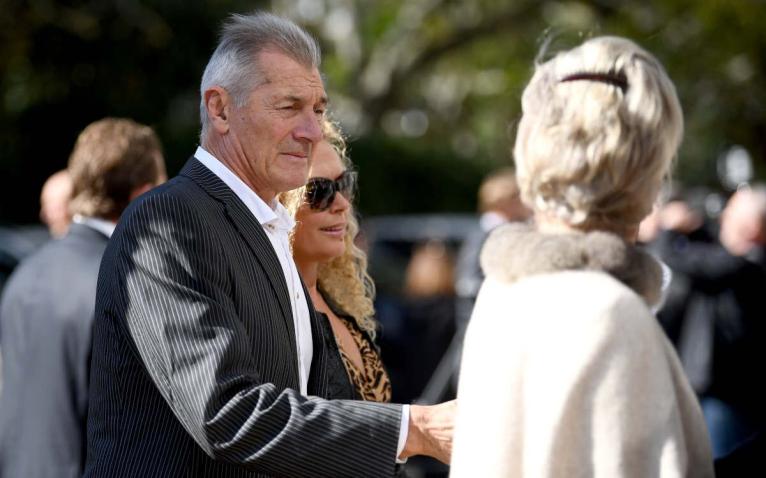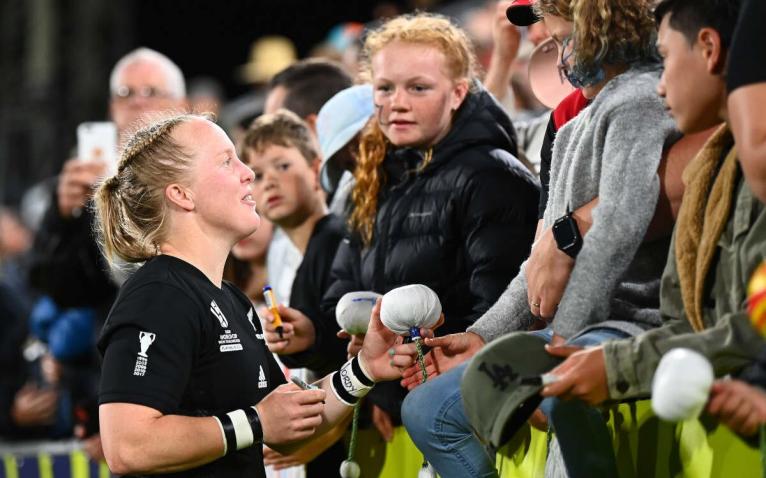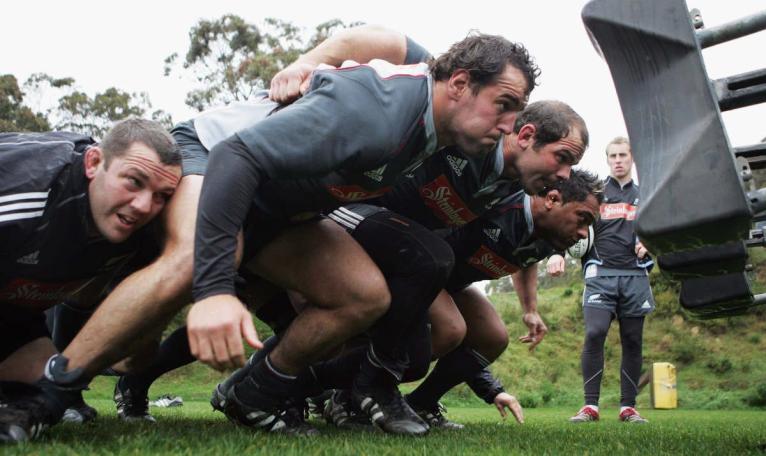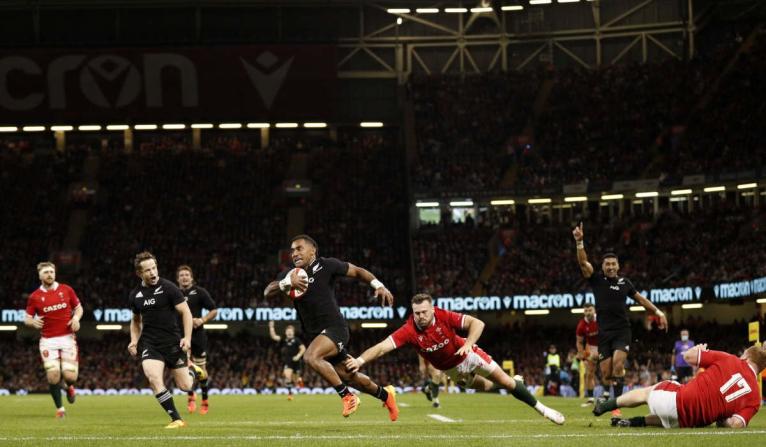It is often taken for granted that rugby union will always be strong at all levels in New Zealand. Rugby is part of the country’s DNA and they possess the most successful side in the history of sport, let alone rugby.
Murray Mexted is widely considered to be one of the greatest players to have ever pulled on the All Blacks jersey. The 34-times capped international is often mentioned in the same breath as other legendary Kiwi players like Colin Meads, Michael Jones and Richie Mccaw. In the digital age, where legitimate views on the game are often drowned out by ill-informed comments, it is sometimes difficult to be heard amid the maelstrom of opinions. But when Mexted speaks, people sit up and take notice such is the respect he has in rugby circles.
Mexted isn’t your typical former player who has been detached from the game for decades. He still works at the coalface of rugby union. The former flanker is managing director of the International Rugby Academy and has played a significant role in identifying some of the best talent in New Zealand, many of whom have gone on to be stars on the international circuit.
It strikes a chord then when Mexted says the game is in trouble, not just in New Zealand but worldwide. He points at the falling participation numbers in the men’s game over the past decade as one of the main problems which keeps him awake at night. No longer can it be taken for granted that the All Blacks will be the best side in the world on a consistent basis.
“I think rugby is definitely under threat in New Zealand,” he says. “There is no doubt about that whatsoever.
“There needs to be some positive decisions made and there needs to be more leadership shown. The club I played in in Wellington is 150 years old. When I played there were 16 teams and now there are only five. There’s been a more rapid drop off since the game went professional because it’s almost getting to the stage where if you don’t make your first XV at school and if you don’t get selected to play in a development team for a Super Rugby franchise, then what have you got left?

“You’ve got the club but there are less people going to play club rugby because they think they’ve missed the boat. That’s just a natural development because of professional rugby.
“I certainly think there’s been a drop off and we need to address it in a smart way because we want the game to grow again. At the moment the men’s game is not growing in our country but what is a big positive is that the women’s game is rapidly growing.
“You look at the total number of players playing the game and if you add the women to the men, then it doesn’t look so bad. But if you say how many male players are there now compared to 20 years ago, then the answer would be probably half the number.
“Our game is threatened and we need to address those issues immediately not just let them ride.”
Most young rugby players in New Zealand start at five years of age in school. I think they should stay within their club until the day they retire
Mexted has never been one to complain without offering solutions and he believes New Zealand has neglected its club system since the introduction of Super Rugby. He also hopes private equity company Silver Lake, who recently invested $NZ 200 million into New Zealand rugby, take a long-term view to strengthening the community game.
“I think we need to promote the benefits and the beauty of continuity,” he said. “Most young rugby players in New Zealand start at five years of age in school. I think they should stay within their club until the day they retire. What we have is players going to secondary school.
“Secondary schools have teams so that breaks the continuity between clubs because they are now playing school rugby. If they don’t make it there’s a drop off because they haven’t got an attachment or an association any longer because they’ve been at high school for five years.
“I think they should stay with their clubs because it will be better for their development. I’m sure Silver Lake can promote and grow involvement at various levels. I get it and I can see that it should also bring more money into the game. It provides more opportunities for the growth of grassroots rugby but history tells us that most of the money goes back into the professional game not the amateur game which is a concern.
“It depends on how the money from private equity is utilised in our country. If it is utilised in the right direction and there’s a fair ratio focussed on growth as well as performance, then that’s great. If that doesn’t happen then it’s not great.”

There is no doubt whatsoever the biggest issue facing professional rugby union is that of the long-term effects of brain injuries. Nearly 200 players have launched legal proceedings against World Rugby, the Rugby Football Union and the Welsh Rugby Union in what has been described as the biggest ‘class action’ lawsuit outside of the United States.
The effects of repeated head knocks and concussion are nothing short of tragic. Only last summer former Wales No 8 Ryan Jones revealed he is suffering from early onset dementia at the age of 41 while the likes of England World Cup-winning hooker Steve Thompson, Michael Lipman, and Alix Popham are in a similar boat.
Rugby is stuck in the middle of a battle between those who want to make it safer to prevent future players suffering brain damage and those who believe the game has gone soft.
Mexted believes the situation with brain injuries is a significant problem which needs to be taken seriously but he is also tired of how referees dominate games.
I played in an era when we didn’t understand concussion. It’s right that we make the game as safe as we can. Players have to learn to tackle below the nipple line
Again he has a solution to this problem.
“I played in an era when we didn’t understand concussion,” he admits. “It’s right that we make the game as safe as we can. Players have to learn to tackle below the nipple line. The way the game is moving anybody who gets hits above the nipple line is vulnerable so surely we should drop the level of contact to waist level? Anywhere above the nipple line means referees jump to conclusions. I’m all for the game being successful and being an attractive game for people to play and to watch. The growth of the game is important to me.
“To see the misinformation and the misunderstanding of why the laws are there all over the world is quite alarming in many respects. The referees have reached a stage where they are dominating the game.
“In my mind it’s all about a contest for possession, utilising space and scoring tries. To do that today, mindful of safety first precautionary rugby, it puts a lot of pressure on referees to produce a safe game.

“But it’s gone out of control and they dominate the game. The referee today is the dominant person on the field and I don’t think it’s right. Then you’ve got these TMOs who have a licence to make decisions and some referees just pass the buck. That’s weak refereeing in my mind. I’m in favour of referees allowing the game to flow and to see the beauty of the game. The stop-start nature of rugby at the moment is not endearing to anyone in my mind. But the responsibility is with the players and coaches to tackle low. Coaches need to do a better job at implementing the new way forward for rugby.
“If you look at American football they had a concussion lawsuit against them so they brought in protective clothing. I’m not sure that was the answer.I think the answer should be to try and remove the dangerous hazards from the game but still allowing a contest.
“One of the things that’s obvious to me is if you lower the tackle height and it becomes compulsory, all of a sudden you’ve got people offloading in the tackle. You can then put more people into space far easier. I think that will speed up the game and make it more appealing.”
I think the All Blacks have addressed the front row and it looks like we are back on track now. The midfield backs also look like they are falling into place. I like Jordie Barrett in midfield.
Mexted’s passion for rugby still burns brightly and he is desperate for the powers that be to solve the current issues which currently plague the game. The All Blacks have come in for a great deal of criticism this year having lost a Test series at home to Ireland while they also lost at home to Argentina for the first time in their history.
Head coach Ian Foster’s neck was on the chopping block but the former Chiefs boss was handed a stay of execution with his assistant coaches Brad Mooar, and John Plumtree instead paying the ultimate price. Mexted insists the All Blacks still have many issues which need to be resolved but is adamant they are back on the right track having bounced back to win the Rugby Championship.
“The series against Ireland identified weaknesses and those weaknesses were apparent in the Rugby Championship as well,” he said. “There were three areas which needed to be addressed in my view. Those were the front row, loose forwards, and the midfield backs. “I think they’ve addressed the front row and it looks like we are back on track now. The midfield backs also look like they are falling into place. I like Jordie Barrett in midfield while it is also good to see Anton Lienert-Brown back from injury.

“However, I don’t think they’ve got the loose forwards right yet. I think there’s a lot of change going to happen there. If they get that right by the time the World Cup comes around we’ll be firing shots – there is no doubt about that.”
With the Rugby World Cup under a year away, it is clear it could be the most hotly contested one to date. Despite the All Blacks losing some of their aura, Mexted is adamant they can lift the Webb Ellis Cup for the fourth time at the Stade de France next November.
He also believes there is a great chance we will see a second northern hemisphere winner.


Comments
Join free and tell us what you really think!
Sign up for free